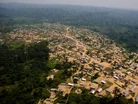DRC lithium interest offset by ESG risks

A new investigation into the Democratic Republic of Congo (DRC)’s nascent but globally significant lithium sector sounds the alarm on a swathe of potential supply chain risks.
Global Witness’ report raises key questions around how future production and its environmental impacts will be managed and who stands to benefit if the DRC’s deposits of hard-rock lithium are exploited to meet the growing demand for minerals critical to renewable energy technologies.
The country’s lithium production is set to begin in 2023, driven by richer nations' efforts to decarbonise their economies. Global lithium demand could grow 40 fold by 2040. But unless regulators, companies and investors take urgent action, what are currently potential environmental and human rights risks, as well as a lack of accountability and transparency, could end up hardwired into the sector.
Global Witness’ investigation looked at a sample block of 51 mining concessions, concentrated close to the town of Manono in southern DRC, where globally significant, hard-rock lithium deposits have been discovered. Three companies – AVZ Minerals, Critical Resource and Tantalex Resources Corporation – have publicly announced plans to carry out lithium exploration or production at mining concessions in the area.
The investigation found concessions on and around DRC’s lithium deposits are or were held by or involved a small number of people with close business relationships – including a now-serving government official and those reportedly close to former President Kabila.
Local Manono communities appear to have differing and at times unclear understanding of the projects and risks related to the impact of the lithium mines, including their environmental impacts.
“For decades, Global Witness has documented how humanity has already pushed the planet to the brink through reckless management of fossil fuels and minerals. We must not repeat those mistakes with the energy transition," said Paul Donowitz, Head of Natural Resource Governance Campaigns at Global Witness.
"Our investigation shows that investors need to think critically before endorsing DRC’s lithium sector. Company contracts, payments and beneficial ownership in key deals are not being fully disclosed, despite this being required by Congolese law. Companies must also ensure they fully respect the environment and communities in the mining areas.
“There is a small window of opportunity to address the potential supply chain risks in DRC’s lithium sector, before production begins. Companies, investors and governments – both of the DRC and companies’ home states – must act now or the whole industry risks being seriously undermined by governance risks and harms to people and the planet."
Recommendations
- Companies financing, producing, using or trading DRC’s lithium must ensure that their investments and operations, as well as those of their subsidiaries and suppliers, adhere to international governance, environmental and human rights standards, and all existing Congolese laws, (whichever are stronger): this includes those pertaining to ownership and control, payments, and contracts, and protection of the environment, health and safety, natural resource extraction and management, wildlife conservation, waste management, hazardous material activity, and air, water, land and groundwater pollution;
- Companies must take responsibility to conduct, disclose and implement robust due diligence policies and procedures to prevent, identify, mitigate and account for human rights, environmental and governance risks in their operations, including supply chains and business relationships;
- The Congolese government should ensure disclosure of all beneficial owners of mining companies, mining contracts and public, project-level payment reporting for all of Congo’s mining contracts, in line with Extractive Industries Transparency Initiative (EITI) reporting standards and best practice.
In the provinces of Tanganyika and Haut-Lomami, in the south-east of the DRC, there is a rich reserve of “spodumene-rich pegmatite-type rocks”, according to the Africa Report. These contain a lithium mineral associated with a stannocoltanian ore.
